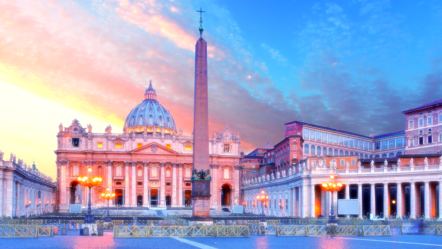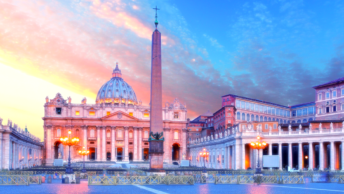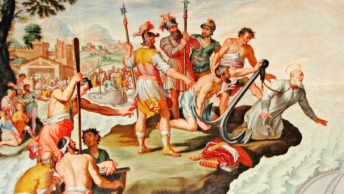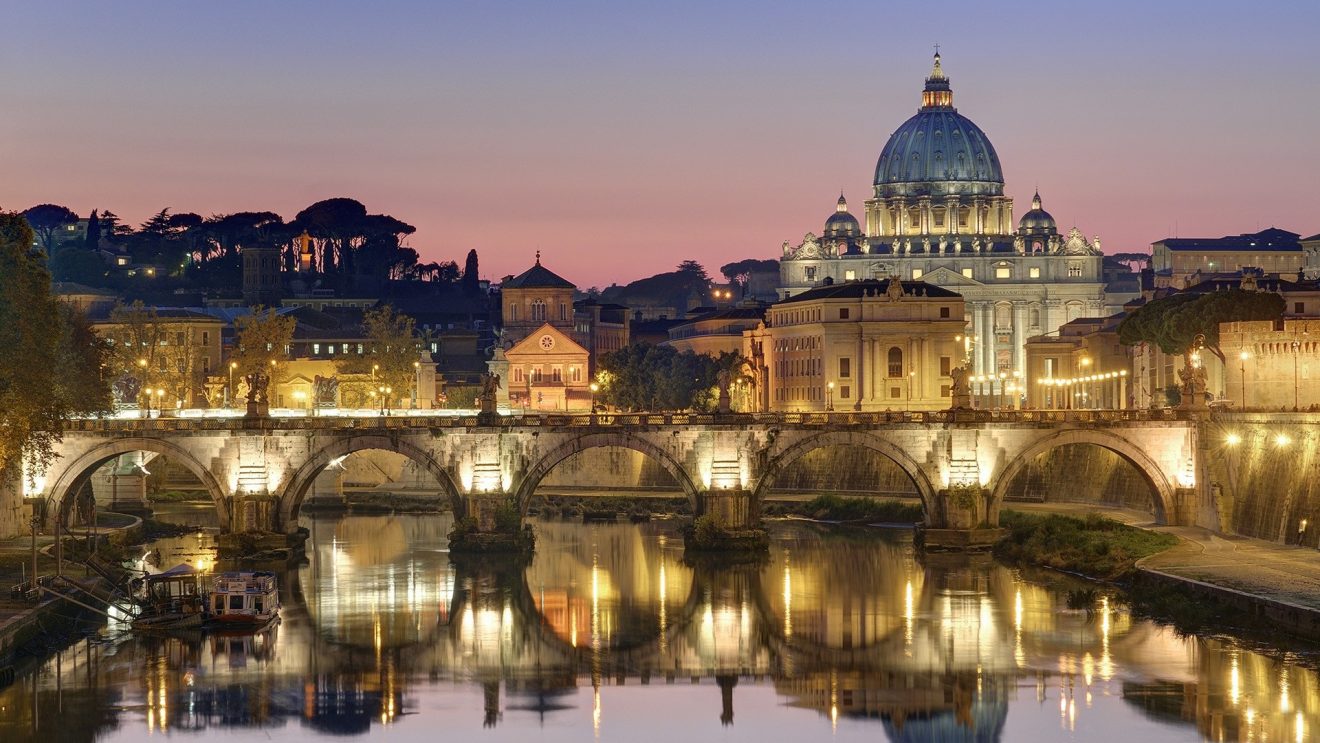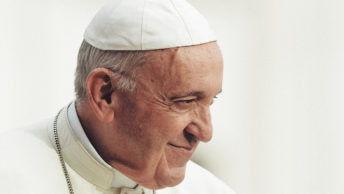In the Synod on Synodality meeting in Rome in October 2023, Pope Francis sought to make inclusion a central theme. To ensure inclusivity he invited women and laymen to be voting members of the synod, a forum that was traditionally restricted to bishops. The month long 344-member Synod on Synodality resulted in an ambitious text advocating greater co-responsibility at all levels of the Church. The final document, Relatio Synodalis, called for new ministries for the laity, increased lay involvement in decision-making, and laity evaluation of bishops’ performance, among other changes. That document provides the foundation for the next synod to be held this October.
There was little dissent among the delegates, who voted on each paragraph. For example, only 67 members voted against the proposal that “theological and pastoral research on women’s access to the diaconate should be continued.” The document did not speak directly to LGBTQ+ people, but instead emphasized the assembly’s “closeness and support to all those who experience the condition of loneliness” because of their adherence to the Church’s tradition and magisterium on marriage and sexual ethics.
Criticism of Relatio Synodalis by traditional theologians, Church leaders and laymen was pointed, intelligent, well-informed theologically and historically, and measured. It needs to be taken seriously by Pope Francis and delegates at the follow-up synod. More than likely, this criticism will be ignored, as suggested by German bishops pushing a radical agenda in their country.
The backlash to the synod came within a context in which Pope Francis endorsed the controversial declaration by the Dicastery for the Doctrine of the Faith in December 2023 that priests could offer blessings to gay couples. This statement, entitled Fiducia supplicans, was rejected en masse by the African bishops, among others. The Dicastery felt compelled to rush out a clarification stating that a blessing on a gay couple may not be given in the context of a ceremony for a homosexual union.
In February, a clearly piqued Pope Francis dismayed traditional Catholics by doubling down on the doctrinal confusion regarding homosexuality. He asserted that people who are “vehemently protesting” the decision to allow blessings “belong to small ideological groups.” He added that the African continent is “special,” however, because for them “homosexuality is something ugly from a cultural point of view; they do not tolerate it.”
While Pope Francis might not be an overt Marxist or even the Antichrist, as some of his critics have labeled him, he is a man of the left, obsessed with equity and inclusion. The problem is that “inclusion” is a wedge word that activists with a clear political agenda have used to take over our institutions, from higher education to large corporations. Inclusion, however, entails the exclusion of those who disagree with the activists’ agenda. Pope Francis is all for inclusion, except for those who challenge him, as in the cases of Bishop James Strickland or Cardinal Raymond Leo Burke.
Pope Francis seems determined to phase out the Latin Mass. He ignores that many young people are attracted to the Church because of its traditional values, and that the majority of young priests are conservative. These young laity and clergy have turned to the Church as a bulwark against the destructive character of modern culture.
The critics of Pope Francis and the Synod on Synodality should be heeded as prophets warning that sharp divergence from traditional doctrine and practice opens the way to fissure within the Church.
Dr. Antonio Francés, a well-known traditional Catholic theologian, writing on the website, OnePeter5, called into question the very legitimacy of the October 2023 synod and its working document, Relatio Synodalis. As he correctly observed, synodality means literally the rejection of representative democracy. Historically, for thousands of years, synods included only ordained bishops. They were not intended to be democratic assemblies. He noted the irony of transforming the traditional bishops’ synod into an assembly of bishops as well as non-bishops (including laypeople), with each delegate having a vote of equal weight, while the Pope has ultimate authority. Thus, while hierarchical authority of the bishops is diluted, the Pope maintains his absolute authority.
Francés believes Relatio Synodalis lays the groundwork for a future statement that women can be ordained as deacons, which he argues wrongly misinterprets some expressions in the New Testament. Equally disturbing for Francés is the document’s heavy reliance on social science rather than Church doctrine or traditional theological metaphysics. Francés contends that such reliance leads to the error of equating gender ideology with mercy, in which “any care for the weak and the marginalized is confused with accepting the demands of this untenable and utterly irrational ideology.”
Listening to the Critics
Another problem with Relatio Synodalis, in Francés’s view, is that the document denounces individualism, while not mentioning the greater evil of Chinese or Venezuelan collectivism. Individualism is condemned, while group rights of excluded minorities and the lonely are treated as a prophetical call for redemption.
The full implication of Relatio Synodalis is the undermining of bishops’ authority. Bishops supporting the document ought to understand that their authority comes from God, not the pope. They have a duty to preserve the apostolic succession and true faith.
Arguably the direst warning about the future of the Catholic Church and Francis’s style of governance came from Professor John Rist, a distinguished patristic scholar at Catholic University and Cambridge University, who warned that division within the Church could be worse than the Arian controversy in the 4th century. In May 2019, he signed an open letter warning that Pope Francis was attempting to undermine Church doctrine by stealth.
Professor Rist expressed his fears for the Church when Pope Francis suspended an Italian priest, Fr. Tullio Rotondo, for a scholarly critique of Pope Francis’s apostolic exhortation Amoris Laetitia. Issued in 2016, Amoris Laetitia (The Joy of Love), following the Synods on Family, called for bishops to consider offering divorced and remarried Catholics access to the sacraments of Reconciliation and the Eucharist. The document recommended a more individualized approach, especially within the context of children in divorced families. Many conservative Catholic theologians raised concerns about the sometimes contradictory and vague wording in Amoris Laetitia.
Professor Rist has joined other theologians who have raised questions about papal infallibility, as developed in his new book on the history of the doctrine of papal infallibility.
German Bishops Fan the Flames
Professor Rist’s criticism of Pope Francis’s authoritarian style toward critics has been reinforced by retired Hong Kong Cardinal Joseph Zen, who flew to Rome to voice his concern about the Synod of Synodality and to meet with Pope Francis. The pontiff refused to meet with the 91-year-old cardinal. Cardinal Zen released publicly his concerns about the synod, especially the inclusion of non-ordained voting delegates, which broke with longstanding tradition. He took aim at what is occurring in Germany, where the Church hierarchy and a group of laypeople propose a “revolutionary change in the constitution of the Church and in the moral teaching about sexuality.”
His concerns were echoed by Bishop Joseph Strickland, who was recently removed by the Vatican from his position in the Diocese of Tyler, Texas, for his opposition to the accommodation of LGBT+ activists. In response to the synod, Bishop Strickland urged Catholics to resist what he saw as the pope’s changes to “the Church’s ancient teachings, while remaining faithful to the ‘the bride of Christ.’” He pleaded to the faithful, “Stay with her, grow more holy, grow closer to the sacred heart of Christ. But please, please don’t abandon her to the foul sinfulness that is overtaking the world, and, sadly the Church as well.”
Cardinal Zen, Bishop Strickland, and other critics of the Synod on Synodality express grave concern that the future of the Church can be foreseen in how the German Catholic Church has responded to the synod.
In the aftermath of the synod, the Catholic Church in Germany began to frame the synod as a mandate for radical change. Bishop Georg Bätzing, president of the German Bishops’ Conference, and Thomas Söding, vice president of the Central Committee for German Catholics, claimed that the Synod on Synodality confirmed that the German path is the correct path. This path includes full inclusion of non- ordained laypeople in Vatican synods. In Germany, non-canonical assemblies of bishops and laypeople have pushed for condoning same-sex relations, the ordination of women, and lay governance of the Church.
The German Church is spinning the assembly as an affirmation of their march toward a democratic Church without a hierarchy. They are driven by a goal to subvert traditional Church teaching on sexuality, under the guise of inclusivity. The Central Committee for German Catholics is an activist organization that has been endorsed by most of Germany’s bishops. Only four of Germany’s 27 bishops voted to block funding for the activist committee. Immediately after the October 2023 synod in Rome, the bishop of Speyer called for priests in his diocese to be open to blessing same-sex unions.
The Central Committee for German Catholics calls for lay preaching in church, preventing the firing of Church employees whose lifestyles do not conform to Church tradition, and the right of Catholics to remarry after divorce or to enter same-sex civil unions.
To his credit, Pope Francis has expressed deep reservations about the German synodal path. Yet, the question remains whether the pontiff, in his demand for inclusion, has opened the door to radical church activists determined to overthrow Church doctrine. As so often happens, well-intentioned and even needed reform could bring unintended, disastrous revolution. Greater inclusion of laity and women is not necessarily a bad idea; the question is how to prevent progressives from hijacking the process.
Cardinal Müller on the Future
In his new book, Vatican Confidential, Cardinal Gerhard Müller addresses Church controversies under Pope Francis and the future of the Catholic Church. His warnings are simultaneously concerning and optimistic. He asserts that Pope Francis’s condemnation of the Latin Mass was unnecessary and theologically wrong. Müller maintains that the pope relied not on theologians but on several professors at the Athenaeum of St. Anselm who personally lobbied for this decision.
On the bright side, greater resistance to the corrupting influence of modernity is found in young priests now entering the priesthood. A recent survey of Catholic priests— the largest in 50 years— reveals “a major shift in how priests view themselves and their priesthood.” This is especially the case for young priests, who are “far more likely to describe themselves as theologically orthodox or conservative.” The survey showed that 52 percent of young priests describe themselves as conservative or very conservative, while another 44 percent describe themselves as moderate. This is a radical shift toward orthodoxy. Nearly 70 percent of those ordained in the years between 1965 to 1969 identified as “progressive” or “very progressive”. That number today has dwindled to almost zero.
In addition, many young women who want to be nuns are religiously orthodox. They fervently oppose abortion and see virginity as something holy. For these young nuns, wearing a habit is a strong statement in opposition to secular culture. This orthodoxy is not just an American phenomenon, but is apparent as well in the United Kingdom, one of the least religious countries, where there is a boom in the number of new nuns.
More Hopeful Signs
At the same time, the Latin Mass inspires fervor in some young Catholics and their families. Even as late as December 2023, despite Pope Francis’s severe restrictions on the availability of Latin Masses, 592 parishes in the United States, out of 17,000 parishes, offered the extraordinary form in Latin.
A Pew Research survey reported that around a quarter of Catholics between the ages of 18 and 29 attend church once a week. For those young Catholics attending Latin Mass, 98 percent regularly attend weekly Mass. Latin Mass devotees are fervent Catholics who should be welcome in the Church.
Another encouraging sign for the future is a huge annual conference of young U.S. Catholics sponsored by the Fellowship of Catholic University Students. Held the last two years in a row in St. Louis, Missouri, the latest conference in January attracted nearly 20,000 people (including 44 bishops and 450 seminarians, plus priests, nuns, college students, and servicemen and women) for inspirational talks and sacraments. A similar conference is planned for 2025 in Salt Lake City.
These young Catholics are rejecting the values of secularization, materialism, postmodernism, trans- humanism, extreme liberalism and atheism— tendencies promoted within modern culture, the media, our educational apparatus, and world financial and political leaders. These young priests, nuns and laypeople are finding happiness in a transcendent faith in a better world to come.
As Cardinal Müller so wisely puts it, children and family bring joy, but these are not enough in themselves. True happiness for many comes from a deeper religious faith, and this is why we say, “Thy kingdom come,” introducing a transcendent perspective to our lives. “For the Christian,” he proclaims, “happiness consists in having found God, the love of God.”
Let us pray that love for God and our Church may overcome the evil we face in a secular world.

